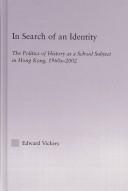| Listing 1 - 4 of 4 |
Sort by
|

ISBN: 1135944253 1280239700 9786610239702 0203488482 9780203488485 9780415945028 041594502X 041594502X 9781135944254 9781280239700 6610239703 9781135944209 9781135944247 9780415865012 1135944245 962809338X Year: 2003 Publisher: New York London Routledge
Abstract | Keywords | Export | Availability | Bookmark
 Loading...
Loading...Choose an application
- Reference Manager
- EndNote
- RefWorks (Direct export to RefWorks)
This book traces the influences that have shaped the secondary school history curriculum during Hong Kong's prolonged political transition between the 1960s and the early 21st century, focusing on the relationship between history and identity.
Education --- Educational change --- Change, Educational --- Education change --- Education reform --- Educational reform --- Reform, Education --- School reform --- Educational planning --- Educational innovations --- Children --- Education, Primitive --- Education of children --- Human resource development --- Instruction --- Pedagogy --- Schooling --- Students --- Youth --- Civilization --- Learning and scholarship --- Mental discipline --- Schools --- Teaching --- Training --- Political aspects --- S27/0850 --- Hong Kong--Education

ISBN: 1138976024 0203955366 113540500X 9781135405007 1299867383 9781299867383 9780203955369 0415948088 9780415948081 9781138976023 9781135405076 9781135405144 1135405077 Year: 2005 Publisher: New York Routledge
Abstract | Keywords | Export | Availability | Bookmark
 Loading...
Loading...Choose an application
- Reference Manager
- EndNote
- RefWorks (Direct export to RefWorks)
Visions of the past are crucual to the way that any community imagines itself and constructs its identity. This edited volume contains the first significant studies of the politics of history education in East Asian societies.
History --- Education --- Children --- Education, Primitive --- Education of children --- Human resource development --- Instruction --- Pedagogy --- Schooling --- Students --- Youth --- Civilization --- Learning and scholarship --- Mental discipline --- Schools --- Teaching --- Training --- Annals --- Auxiliary sciences of history --- Study and teaching --- Political aspects
Book
ISBN: 0203734084 1135007276 9781135007270 9780203734087 0415855780 9780415855785 9781135007256 113500725X 9781135007263 1135007268 9781138295216 1138295213 9780415855785 Year: 2015 Publisher: London
Abstract | Keywords | Export | Availability | Bookmark
 Loading...
Loading...Choose an application
- Reference Manager
- EndNote
- RefWorks (Direct export to RefWorks)
"In many non-Western contexts, modernization has tended to be equated with Westernization, and hence with an abandonment of authentic indigenous identities and values. This is evident in the recent history of many Asian societies, where efforts to modernize - spurred on by the spectre of foreign domination - have often been accompanied by determined attempts to stamp national variants of modernity with the brand of local authenticity: 'Asian values', 'Chinese characteristics', a Japanese cultural 'essence' and so forth. Highlighting (or exaggerating) associations between the more unsettling consequences of modernization and alien influence has thus formed part of a strategy whereby elites in many Asian societies have sought to construct new forms of legitimacy for old patterns of dominance over the masses. The apparatus of modern systems of mass education, often inherited from colonial rulers, has been just one instrument in such campaigns of state legitimation. This book presents analyses of a range of contemporary projects of citizenship formation across Asia in order to identify those issues and concerns most central to Asian debates over the construction of modern identities. Its main focus is on schooling, but also examines other vehicles for citizenship-formation, such as museums and the internet; the role of religion (in particular Islam) in debates over citizenship and identity in certain Asian societies; and the relationship between state-centred identity discourses and the experience of increasingly 'globalized' elites"--
Book
ISBN: 9888754939 9789888754939 Year: 2023 Publisher: Hong Kong : HKU Press,
Abstract | Keywords | Export | Availability | Bookmark
 Loading...
Loading...Choose an application
- Reference Manager
- EndNote
- RefWorks (Direct export to RefWorks)
Explores the making and consumption of conflict-related heritage throughout the Asia-Pacific region. Contributing to a growing literature on 'difficult heritage', this collection advances our understanding of how places of pain, shame, oppression, and trauma have been appropriated and refashioned as 'heritage' in a number of societies in contemporary East and Southeast Asia and Oceania. The authors analyse how the repackaging of difficult pasts as heritage can serve either to reinforce borders, transcend them, or even achieve both simultaneously, depending on the political agendas that inform the heritage-making process. They also examine the ways in which these processes respond to colonialism, decolonization, and nationalism.
Collective memory --- Imperialism --- History. --- Asia --- East Asia --- Pacific Area --- Politics and government.
| Listing 1 - 4 of 4 |
Sort by
|

 Search
Search Feedback
Feedback About UniCat
About UniCat  Help
Help News
News